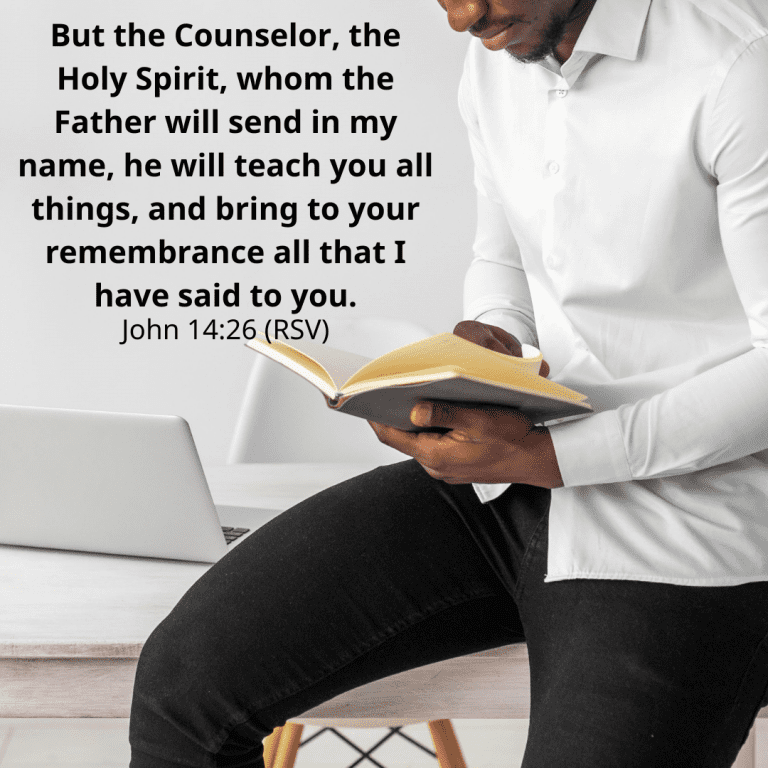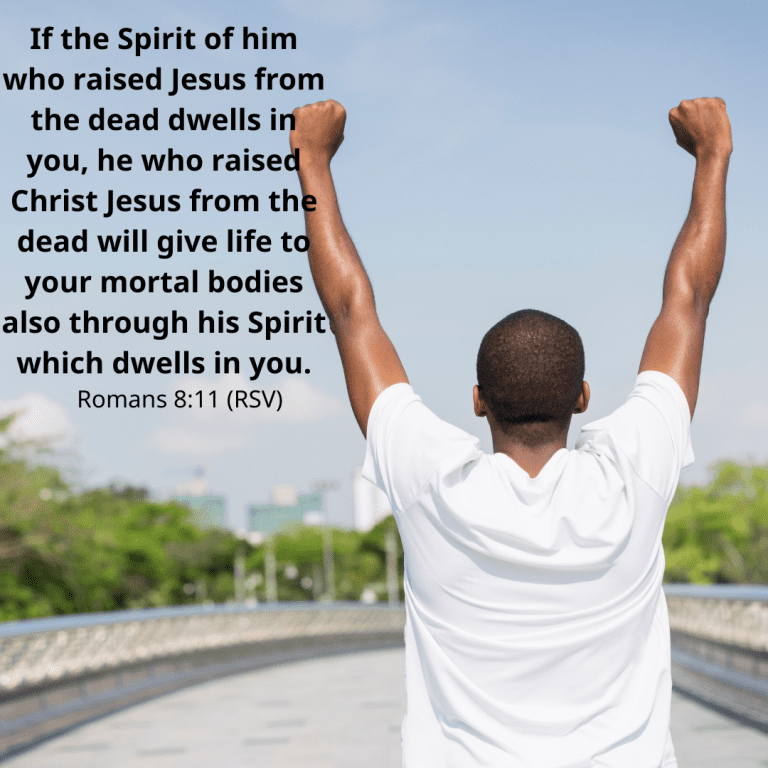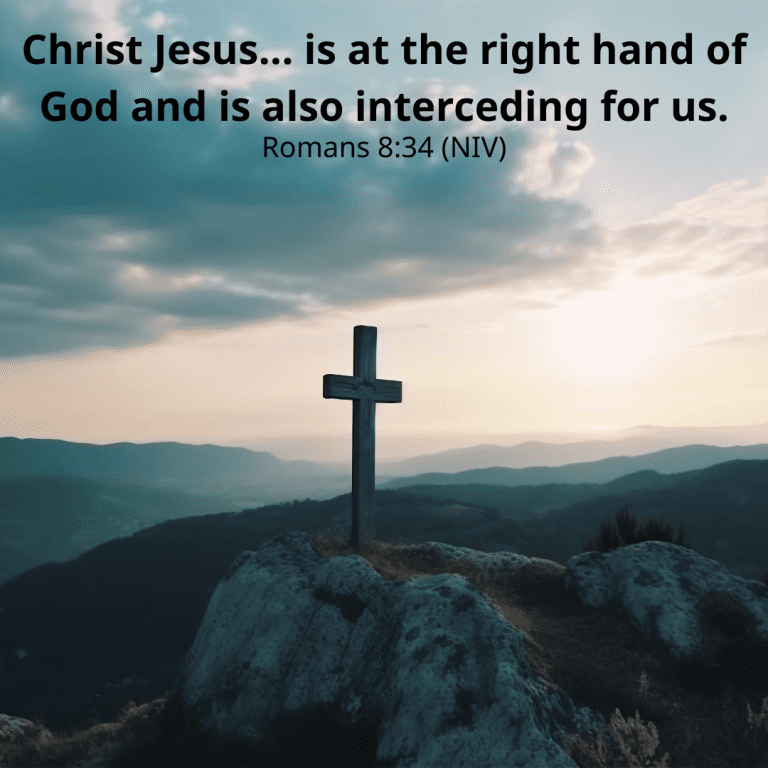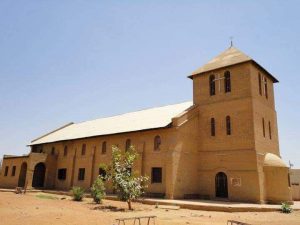1-2 Saul approved the stoning of Stephen. Some faithful followers of the Lord buried Stephen and mourned very much for him.
Saul Makes Trouble for the Church
At that time the church in Jerusalem suffered terribly. All of the Lord's followers, except the apostles, were scattered everywhere in Judea and Samaria. 3 Saul started making a lot of trouble for the church. He went from house to house, arresting men and women and putting them in jail.
The Good News Is Preached in Samaria
4 The Lord's followers who had been scattered went from place to place, telling the good news. 5 Philip went to the city of Samaria and told the people about Christ. 6 They crowded around Philip because they were eager to hear what he was saying and to see him work miracles. 7 Many people with evil spirits were healed, and the spirits went out of them with a shout. A lot of paralyzed and lame people were also healed. 8 Everyone in that city was very glad because of what was happening.
9 For some time a man named Simon had lived there and had amazed the people of Samaria. He practiced witchcraft and claimed to be somebody great. 10 Everyone, rich and poor, crowded around him. They said, “This man is the power of God called ‘The Great Power.’ ”

11 For a long time, Simon had used witchcraft to amaze the people, and they kept crowding around him. 12 But when they believed what Philip was saying about God's kingdom and about the name of Jesus Christ, they were all baptized. 13 Even Simon believed and was baptized. He stayed close to Philip, because he marveled at all the miracles and wonders.
14 The apostles in Jerusalem heard that some people in Samaria had accepted God's message, and they sent Peter and John. 15 When the two apostles arrived, they prayed that these people would be given the Holy Spirit. 16 Before this, the Holy Spirit had not been given to any of them, though some of them had been baptized in the name of the Lord Jesus. 17 Peter and John then placed their hands on everyone who had faith in the Lord, and they were given the Holy Spirit.
18 Simon noticed that the Spirit was given only when the apostles placed their hands on the people. So he brought money 19 and said to Peter and John, “Let me have this power too! Then anyone I place my hands on will also be given the Holy Spirit.”
20 Peter said to him, “You and your money will both end up in hell if you think you can buy God's gift! 21 You don't have any part in this, and God sees that your heart isn't right. 22 Get rid of these evil thoughts and ask God to forgive you. 23 I can see that you are jealous and bound by your evil ways.”
24 Simon said, “Please pray to the Lord, so that what you said won't happen to me.”
25 After Peter and John had preached about the Lord, they returned to Jerusalem. On their way they told the good news in many villages of Samaria.
Philip and an Ethiopian Official

26 The Lord's angel said to Philip, “Go south along the desert road that leads from Jerusalem to Gaza.” 27 So Philip left.
An important Ethiopian official happened to be going along that road in his chariot. He was the chief treasurer for Candace, the Queen of Ethiopia. The official had gone to Jerusalem to worship 28 and was now on his way home. He was sitting in his chariot, reading the book of the prophet Isaiah.

29 The Spirit told Philip to catch up with the chariot. 30 Philip ran up close and heard the man reading aloud from the book of Isaiah. Philip asked him, “Do you understand what you are reading?”
31 The official answered, “How can I understand unless someone helps me?” He then invited Philip to come up and sit beside him.
32 The man was reading the passage that said,
“He was led like a sheep
on its way to be killed.
He was silent as a lamb
whose wool
is being cut off,
and he did not say
a word.
33 He was treated like a nobody
and did not receive
a fair trial.
How can he have children,
if his life
is snatched away?”
34 The official said to Philip, “Tell me, was the prophet talking about himself or about someone else?” 35 So Philip began at this place in the Scriptures and explained the good news about Jesus.
36-37 As they were going along the road, they came to a place where there was some water. The official said, “Look! Here is some water. Why can't I be baptized?” 38 He ordered the chariot to stop. Then they both went down into the water, and Philip baptized him.
39 After they had come out of the water, the Lord's Spirit took Philip away. The official never saw him again, but he was very happy as he went on his way.
40 Philip later appeared in Azotus. He went from town to town, all the way to Caesarea, telling people about Jesus.
Shaawul mɔŋgwɔ ǝwɽi kǝniisǝ yǝy-lɔ.
1 Nǝ Shaawul ǝni kwǝmminǝ ŋiɽany ŋǝthi Isṯifaanuus. Nǝ ki-laamin-la ṯǝ kila, nǝ ṯurvǝ ṯɔppa ṯǝthi ṯǝwɽǝ yǝy-lɔ ǝndiṯhǝ kǝniisǝ Urshaliim, nǝ kila lǝthi ṯǝmminǝ tatap avri nǝr faathalɔ faṯ-faṯ, laakin yaavɔr tǝ nǝrtǝ naanalɔ kinnǝni ŋundu-ŋǝ, nǝ lizi faathitha muḏiiriiyyǝ naanɔ kwǝthi Yahuuḏiiyyǝ-ŋw, nǝ kwǝthi Saamira-ŋw tok. 2 Nǝ lokwo kila lǝṯiɽi Allah-na aanitha Isṯifaanuus-ŋwɔ, mindaŋ nǝr aaritha ŋwundǝ-ŋwundǝ ŋwal-ŋi. 3 Ǝṯi Shaawul kette ŋɔma tig-tig ethi kiirasi kǝniisǝ-lɔ, mindaŋ ǝṯɔŋw ǝnḏinḏi ki-yiŋna-na ǝṯɔŋw mɔmlɔtta lɔɔrɔ-ŋwɔsi laaw-li ǝṯɔŋwsi kaṯṯɔ ki-sijin-nǝ.
Lizi mǝr-gwɔ aari bǝshirǝ Inyjiilǝ Saamira-na.
4 Nǝ lizi kila lǝthi ṯǝmminǝ limǝ faathi, nǝreele ǝzir naana tatap ethaari bǝshirǝ ŋiɽaŋali ŋǝthi Allah. 5 Nǝ Fiilibbus ele ki-mǝḏiinǝ-nǝ kwɔppa kwǝthi Saamira-ŋw, nɔŋwɔccǝ lizi bǝshirǝ Kwɔrɔstɔ-ŋgi. 6 Nǝ ŋwɔdɔŋw kettice ŋiɽaŋali yǝy ŋa ŋandisasi Fiilibbus, nǝ kinaŋw nigittar yǝni ethi niŋnaci, nǝr iisacci ŋilima ŋǝrrǝ-ŋwsi. 7 Nǝ rigɽim rigii ruuthǝ ki-lizi-nǝ littǝzir raarɔ kwɔɔla ŋɔmmaŋi, nǝ yiborkon-ŋǝ yomsoŋ-yi yittǝzir sǝwinni. 8 Mindaŋ nǝ ṯinyiŋlana ṯɔppa ǝnḏithǝ mǝḏiinǝ ŋgwa.
9 Nǝ kwǝr naani kwette kinaŋw kwǝni Sim@aan ki-mǝdilnǝ-nǝ ŋgwa kwǝṯi ǝrri ŋilima baayil-gi, mindaŋ ǝṯɔŋw liŋɽi lizi lǝthi Saamira-ŋw, kaka nuruusǝ-ŋgwɔ rogɽo ruuŋwun kwizi kwette kwɔppa ŋɔɔrɔ, 10 ǝṯir kettice ŋiɽaŋali ŋuuŋun yǝy, kila lir ŋɔɔrɔ ŋokɔɽony nǝ lɔppa ŋɔɔrɔ tok, ǝṯiraarɔŋw, “Kwɔr-ŋgwɔ kwir-mi ŋɔma ŋǝthi Allah ŋǝṯir-ŋi aarɔŋw, ‘Ŋǝni Ŋɔma Ŋɔppa’.” 11 Ǝṯir kegittice yǝni kaka nǝṯɔŋwsi-ŋwɔ liŋɽilɔ kinaŋw tuk ŋilim-ŋi ŋuuŋun ŋǝṯɔŋwsi ǝrri-ri 12 Laakin mǝr ǝmmini ŋiɽaŋali ŋisaaw ŋǝccǝsi-ŋi Flilibbus bǝshirǝ ŋǝthi Ŋeeleny ŋǝthi Allah, nǝ ŋǝthi yiriny yǝthi Yǝcu Kwɔrɔstɔ tok, nǝraari @ammiḏa lir lɔr nǝ lir laaw tok. 13 Mindaŋ nǝ Sim@aan ǝmmini tok; mindaŋ mɔŋw aari @ammiḏa tǝ, nɔŋw naanasi Fiilibbus-ŋwɔ keṯṯok, mindaŋ ǝṯɔŋw liŋɽi mɔŋwseese ŋir ŋwundǝ-ŋwundǝ, nǝ ŋir ŋilim ŋɔppa-ŋɔppa ŋǝrrinǝ tok.
14 Mǝ yaavɔr neŋne yinaanɔ Urshaliim ethaarɔŋw lizi lǝthi Saamira-ŋw limǝmmini ŋiɽaŋali ŋǝthi Allah, nǝrsi usici Bɔṯrɔs-ŋwɔsi Yuhanna-gi. 15 Mǝr ɔppathi tǝ, nǝr ǝrici lizi kiyiiriny kila limǝmmini, ethaavi Ṯigɽimǝ Ṯirllinǝlɔ ter. 16 Kaka niti mǝgwɔ Ṯigɽim Ṯirllinǝlɔ ter ere dappitha kinnǝ kwizi-lǝ kweere mac; kaka naarir-gwɔ @ammiḏa yiriny-yi yǝthi Kweeleny kwǝni Yǝcu ṯɔɽɔk. 17 E-ta nǝsi Bɔṯrɔs-ŋǝ Yuhanna-gi kette rii ŋwɔɽa-la ŋweeŋen, mindaŋ nǝr aavi Ṯigɽimǝ Ṯirllinǝlɔ ter.
18 Nǝ mǝ Sim@aan ese Ṯigɽimǝ ṯimǝr inḏǝthǝ lizi lǝthi ṯǝmminǝ kinaŋw mǝsi yaavɔr kette rii reeŋen ŋwɔɽa-la ŋweeŋen. Ŋwɔṯaŋw mindaŋ nɔŋw alla gwuruushǝ nɔŋw naŋni ethi inḏǝthǝ Bɔṯrɔs-ŋwɔsi Yuhanna-gi, 19 nɔŋwsǝccǝŋw, “Nḏǝthǝr-nyii ŋɔma ŋɔ tok, mindaŋ mǝnyii kette rii riinyi tok kwizi-lǝ kweere nyithak, ŋwaavi Ṯigɽimǝ Ṯirllinǝlɔ ter.”
20 Laakin nǝ Bɔṯrɔs ǝŋnici nɔŋwɔccǝŋw, “Nḏi gwuruush-gi kwɔɔŋa ki-jahannam-nǝ, kaka nigittathi-ŋa-gwɔ ethaarɔŋw haḏiiyyǝ wǝthi Allah wǝṯiri iila gwuruushǝ! 21 A kwiti kwǝthi lɔɔɽɔŋi leere ki-ŋothɽor-na ŋǝri ḏuṯ, kaka niti nirilli-gwɔ ṯɔgwor-lɔ ṯɔɔŋwa mac kiyǝnǝ yǝthi Allah. 22 Ŋwɔṯaŋw urlǝ ṯɔgwor-lɔ fikir-gi kwɔɔŋa kwigii, mindaŋ aari Kweelenyi kiyiiriny ethi fivrici ŋaaŋwɔ ŋiɽaŋali ŋǝthi ǝfkǝr wir kaka wɔ. 23 Kaka niisaŋa-gwɔ kwuurǝnnǝ ŋǝsuuthǝ-nǝ deddep ŋiɽii cer-cer, nǝ noro musjuun kwǝthi ŋikiya tok.” 24 E-ta nǝ Sim@aan ǝccǝ Bɔṯrɔs-ŋwɔsi Yuhanna-gi ŋwɔ, “Min fǝḏilkwɔm, ǝricǝr-nyii Kweelenyi kiyiiriny mindaŋ mǝ kwomne-ŋgwɔ kwandisa-ŋa ere ǝrrinici nyuŋwɔ kweere mac.” 25 Mǝ Bɔṯrɔs-ŋǝ Yuhanna-gi ruwǝzi shahaaḏa-lɔ kweeŋen, mindaŋ mǝr andasi ŋiɽaŋali ŋǝthi Kweeleny tok tǝ, nǝr aaɽitha Urshaliim. Nǝ kinaŋw ninḏir ki-thaay-la nǝr aaritha bǝshirǝ-lǝ Inyjiilǝ ki-ŋwilli-na ŋwittǝzir ŋwɔthi Saamira-ŋw.
Fiilibbus mɔŋgwɔ ǝccǝ wǝziirǝ @immiḏa wǝthi Athiyuubiyǝ-ŋw.
26 Nǝ meleka kwǝthi Kweeleny ǝccǝ Fiilibbus-ŋwɔ, “Diiɽu iilatha jǝnuub-ŋgi, mindaŋ a mithǝ ṯaay-lɔ kidar ṯuruuthu Urshaliim tinḏi etheele Ghaza.” Nǝ ṯaay kɔthɔ ǝni ṯiti ṯǝṯir-thi ele kwokwony kirem mac. 27 Ṯaŋw nǝ Fiilibbus diiɽi nɔŋweele. Nǝ kǝrcu kette kir Athiyuubii, kir wǝziir wǝthi mǝlika kwǝthi Athiyuubiyǝŋw, kwimthi khazna, nɔŋw iila kwinḏi ethaaɽitha dɔɔnɔ. Nɔŋw naana Urshaliim-ŋgi kwɔgwɔcca Allah-lɔ, mindaŋ nɔŋw aaɽa kwǝllithi karrɔ-la ethaaɽitha dɔɔnɔ. 28 Nǝ kinaŋw ninḏiŋw karrɔ-gi ki-thaay-la, nɔŋw ɔrtatha kiṯaab-la kǝthi kwiɽii kwǝni Isha@ya. 29 Nǝ Ṯigɽim Ṯirllinǝlɔ ter ǝccǝ Fiilibbus-ŋwɔ, “Nḏi a ḏɔŋgwatha keṯṯok naanɔ-gwɔ karrɔ.” 30 Nǝ Fiilibbus avri nɔŋweele naanɔ-ŋgwɔ, mindaŋ nɔŋw niŋnaci kwɔrtɔ kiṯaabi kǝthi kwiɽii kwǝni Isha@ya. Mindaŋ nɔŋw uṯicǝlɔ nɔŋwɔccǝŋw, “Ŋa ŋilŋithi-ŋǝsi ŋa ŋɔrtɔ-ŋǝsi-a?”
31 Nǝ wǝziir ǝŋnici nɔŋwɔccǝŋw, “Ŋǝnyji elŋe aŋgwɔrɔ mǝnyji kwizi kweere ere uppucinǝ mac?” Nɔŋw andaci Fiilibbus-ŋwɔ ethi dallɔ ethi-gi aɽɔmaṯṯi ndǝndǝk karrɔ-la. 32 Nǝ ŋa ŋɔrtɔ-ŋwsi ŋinaanɔ Kiṯaab-na Kirllinǝlɔ ter nǝroro ŋɔ:
“Kwir kaka kaaŋal kiilǝr ethi uɽu kworo,
nɔŋworo kaka tirany titi tǝṯi ɔvi kworo mac,
mǝr fiyǝŋthǝ yaala-lɔ yuuŋwun,
nɔŋwseere andasi ŋeere mac.
33 Ki-ṯǝjlinǝ-nǝ ṯuuŋwun nǝ ŋirllalɔ tok, nǝr-tǝ dirnathalɔ
tɔttɔr.
Nǝ ǝyǝ kwɔrɔ kwǝthi ŋɔma ethisi andasi ŋǝthi ŋwɔɔla
ŋwuuŋwun,
kaka mǝgwɔ ŋimiitha ŋuuŋun ernene kɔnɔŋw kwurǝyu-lu.”
34 Nǝ wǝziir uṯici Fiilibbus-ŋwɔ-lɔ nɔŋwɔccǝŋw, “Andica-nyii-ṯi kwiɽii kwandisj ŋiɽaŋali ŋǝthi ǝyǝ? Ŋǝthi rogɽo ruuŋwun ŋirii, alla ŋǝthi kwɔthaathɔ ŋir?” 35 E-ta nǝ Fiilibbus aari ibṯǝḏi ethi andasi, mindaŋ nɔŋw andaci ŋiɽaŋali ŋinaanɔ Kiṯaab-na Kirllinǝlɔ ter, ŋir ŋiɽaŋal ŋisaaw ŋǝni Yǝcu. 36 Mǝreele ki-thaay-la mindaŋ mǝr ɔppathi kǝzir wǝthi ŋaaw tǝ, nǝ wǝziir ǝccǝŋw, “Ŋaaw ŋirpa-ŋɔ kɔnɔŋw. Aatha kwɔrɔ kwǝnyii ṯiinyini ethaari @ammiḏa?” [ 37 Nǝ Fiilibbus ǝccǝŋw, “A kwǝthi ŋɔma ethaari @ammiḏa mǝmmini ṯɔgwor-thi ṯɔɔŋwa min-min.” Nɔŋw-ǝŋnici nɔŋwɔccǝŋw, “Aw nyii kwǝmminǝ Yǝcu Kwɔrɔstɔ-ŋw kwir Tɔr tǝthi Allah.”]
38 Nǝ wǝziir rilli karrɔwa, mindaŋ nǝ Fiilibbus-ŋǝ ŋundu-gi ɔɽi ŋaaw-na, nǝgwɔ Fiilibbus ǝccǝ ŋunduŋw @ammiḏa. 39 Mǝr dallithalɔ ŋaaw-na tǝ, naǝ Ṯigɽim ṯǝthi Kweeleny dimmi Fiilibbus-ŋwɔ kithaay nyettec. Mindaŋ nǝ wǝziir ere ese ŋunduŋw kwokwony mac, laakin nɔŋw-tǝ ele ki-thaay-la ṯuuŋwun dɔṯṯɔk, kwɔmǝ urǝnni-nǝ ṯinyiŋla-thina deddep. 40 E-ta nǝ Fiilibbus inḏa rogɽo ruuŋwun Ashḏuuḏ, nɔŋw aarithala bǝshirǝ Inyjiilǝ muḏunǝ naana tatap mindaŋ nɔŋw ɔppathi Gaysariiyyǝ.


